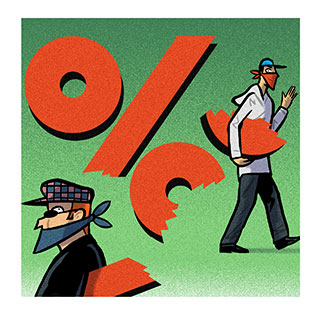There’s a Wall Street war on the horizon. So says best-selling author Michael Lewis, who’s making the rounds promoting his new book The Big Short, an autopsy of the financial meltdown and, even more, a narrative of the handful of traders who saw the subprime meltdown looming, shorted that troubled industry (i.e., bet against it—big time), and made billions.
Lewis, in an interview with Reuters, said he anticipates a “collision” within the Senate banking committee’s financial reform negotiations, led by Sen. Chris Dodd (D-Conn.), on the issue of whether to bust up big banks like Citigroup, Bank of America, JPMorgan Chase, and Wells Fargo. “To put it in the crudest possible way, these firms have to be smaller and less profitable,” Lewis said. “If they were regulated properly and the rules of their game were sane, it would be less profitable to be a trader at a big Wall Street firm…It is really a war over money.”
Lewis is almost certainly right. When the Senate banking committee begins marking up Dodd’s financial reform bill next week, one of the most contentious issues in Dodd’s new bill, released Monday, is the intent to prevent big, supermarket banks from gambling with their own funds for their own gain (also known as “proprietary trading”) and to block them from investing in other financial casinos like hedge funds and private equity funds. Conservatives don’t like the proprietary trading language at all, saying it’s unwelcome government meddling in the markets. Liberals have cried foul because they believe Dodd kneecapped the ban by requiring a six-month review period before taking any action. What’s for certain is the prop trading ban will divide the banking committee in the coming weeks, and it’ll take a fight for Dodd and his liberal allies to keep the ban in the bill.
















